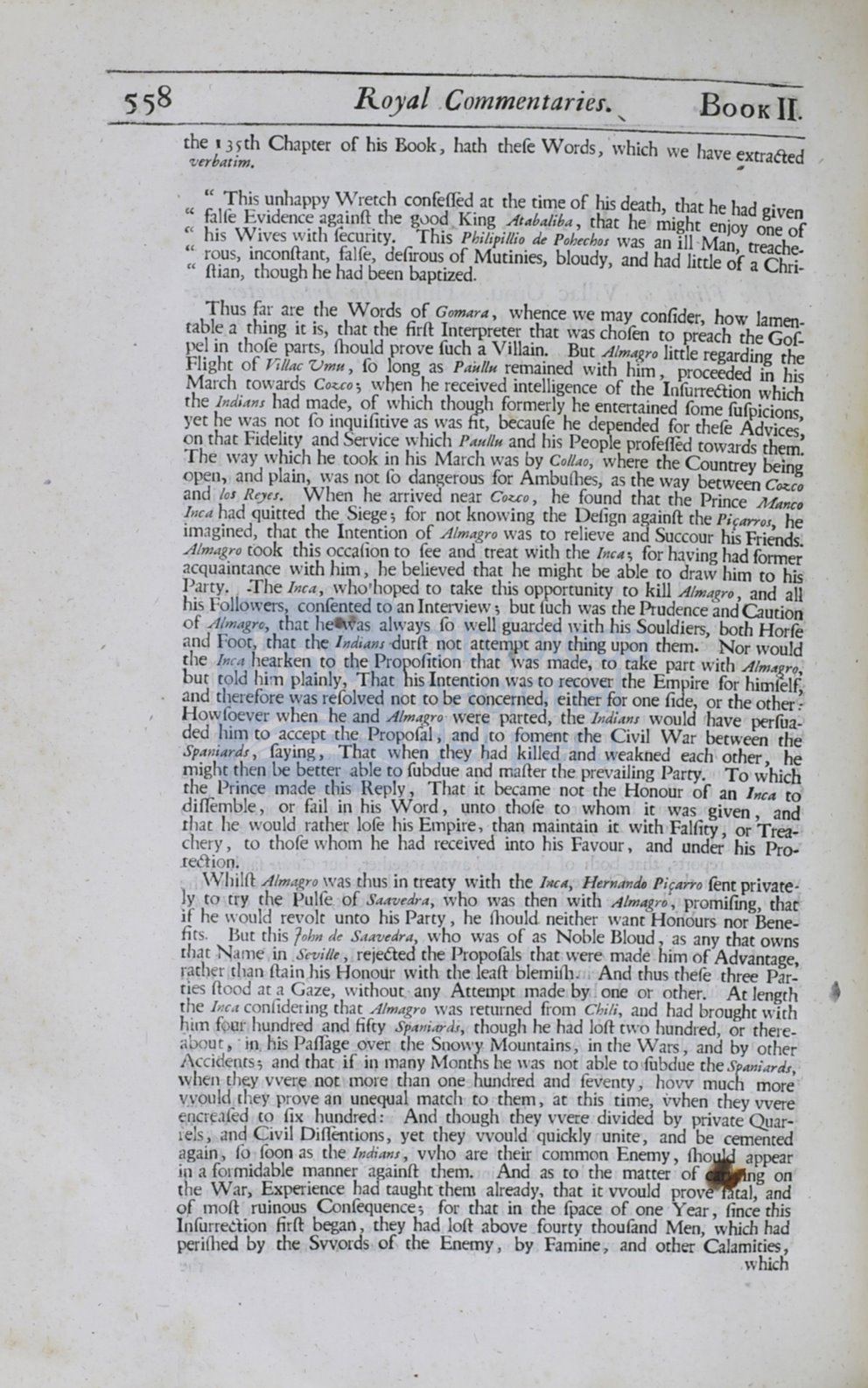

,
Royal
Commentaries.
BooK
II.
· the
1
3
?th Chapeer of his Book, hath thefe Words, which we have
exttat1:ed
,
verbatim.
"'
" " This
~nhappy
\Y
retch
confe[ed_ at
the
ti~e
of
his
death, that he
had
given
,,
f~lfe Ey1denc~
agarnfr. the guo9
Ki~~
.A_taba!tba,
that he might enjoy one of
h1s
Wives
with (ecunty. This
PhsLtpt!lto de Pohecho1
was
an ill
·Man
treache.–
,, rous, inconfrant, falfe, defrrous of Mutinies, bloudy, and had little
o'f
a
Chri–
" fiian, though he had been baptized.
Thus
far
are the Words of
Gomara,
whence we may confider, how
lamen–
table
a
thing it is, that the firfi Interpreter that was chof
en
to preach the Gof-
el
in thofe parts, !hould prove fuch
a Villain.
But
ALmagro
little regarding the
Flight of
Pi/lac Vmu,
fo
long as
Paullu
remained with
him ,
proceeded
in
his
March towards
Co<:.co;
when he received intelligence of the Inforretlion which
the
Jndian1
had made, of which though formerly he entertained fome fufpicions
yet
he
was not fo inquifitive as was fit, becaufe he depended
for
thefe Advices,
on that Fidelity and Service which
Paullu
and his People profeffed towards them:
The way which he took in
his
March was by
Collao,
where the Countrey
being
.open, and plain, was not
[o
dangerous for Ambulhes, as the
way
between
c~co
and
los
Reye1.
When he arrived near
Couo,
he found that the Prince
Manco
!nca
~ad
quitted the
Sieg~;
for not knowing the I?efign againfi the
Pifarro1,
he
1magmed, that the Intention of
Almagro
was
to
relieve and Succour
hls
Friends.
Almagro
took this occafion
to
fee and treat with the
Inca;
for
having had
fonner
acquaintance with him, he believed chat he might be able to draw him to
his
Party.
..The
Inca,
who•hoped
to
take
this
opportunity to
kill
A!magro,
and
all
his Followers, confented to an Interview; but fuch was the Prudence and
c.aution
of
Almagro,
that he
as
ah\
ays fo well guarded with his Souldiers, both Horfe
and Foot, that the
lndian1
·durfi not attempt any thing upon them. Nor would
the
Inca
hearken
to
the Propofition that was made,
to
take part with
Almttgro,
but told
him
plainly, That
his
Intention was
to
recover the Empire
for
himfelf,
and therefore was refolved not to be co·ncerned, either
for
one fide, or the other:
Howfoever when he and
Almagro-
were parted, the
Indians
would have
perfua–
ded him to accept the Propofal , and to foment the Civil War between the
Spaniard1,
faying, That when they had killed and weakfled each
other,
he
might then be better able to fubdue and rnafter che prevailing Party. To which
the Prince made
this
Reply~
That
it
became not the Honour of
an
Inca
to
diffemble, or
fail
in
his Word , unto thofe to whom
it
was given, and
rhat he would rathet lofe his Empire,
than
maintain
it
with Falficy, or Trea–
chery, to thofe whom he had received into his Favour, and under
his
Pro–
recrion.
\h/hilll:
Almag,ro
\Vas thus
in treaty
with
the
/nett, Hernando Pifarro
fent
private· .
ly
to
try the Pulfe of
Saavedra,
who
was
then with
Almagro,
promifing,
that
if
he would revolt unto his Party , he fhould neither want Honours- nor Bene–
fit .
But
this
{ohn
d~
Saavedra,
who was of
as
Noble Blood
as any that owns
rhat
Name in
Seville,
rejected the Propofals that were made
him
of Advantage,
rather than
fl:ain
his Honour wich
the leaft
blemllb. And thus thefe three Par–
ties flood
at a
Gaze, without any Attempt made by one ot other. At
length
the
Inca
coofidering chat
Almagro
was returned from
Chili,
and had brought
V\
ith
him
foor
hundred and
fifty
Spanittra1,
though he had loft
tv:o
hundred, or there-
. bout
b
· in
his
PaiTage over the Soovvy Mountains,
in
the Wars, and
by
other
cidencs; and rhat
if
iQ
many Months he was not able to
1
fu
bdue
the
Spani11rd.r,
when
they
vvere
not
more than one hundred and fevenry, hovv much more
vvould they prove an unequal march to them, at this time, when they vvere
encreafed
to
fix
hundred: And though they vere divided by private Quar-
el
,
and
Civil
Diffentions, yet they vvould quickly unite, and be cemented
again
fo
foon as the
Jndiani,
vvho are their common Enemy, fho
appear
·n a formidable manner againfr them.
And
as
to
the matter of
g
on
the
War, Experience
had
taught
them
already:. that it vvould prove
ca], and
of
mofi ruinous Confequence;
for
that
in
the fpace of one
Year,
fince
this
Infurrettion
firfr
began, they had lofl: above fourty thoufand Men,
which
had
perHhed
by
the Svvords of the Enemy,
by
Famine, and other Calamities,
which














